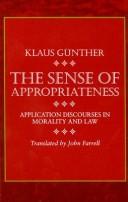| Listing 1 - 1 of 1 |
Sort by
|

ISBN: 0585092591 9780585092591 0791415511 079141552X 1438405235 Year: 1993 Publisher: Albany State University of New York Press
Abstract | Keywords | Export | Availability | Bookmark
 Loading...
Loading...Choose an application
- Reference Manager
- EndNote
- RefWorks (Direct export to RefWorks)
Günther's book demonstrates that most objections to moral and legal principles are directed not against the validity of principles but against the manner of their application. If one distinguishes between the justification of a principle and its appropriate application, then the claim that the application of the principle in each individual case follows automatically from its universal justification proves to be a misunderstanding. Günther develops this distinction with the help of Habermas's discourse theory of morality. He then employs it to extend Kohlberg's theory of moral development and to defend this against Gilligan's critique. In the third and fourth parts of the book, Günther shows--in debate with Hare, Dworkin, and others--how argumentation on the appropriate application of norms and principles in morality and law is possible.
Appropriateness (Ethics) --- Norm (Philosophy) --- Prudence. --- Law --- Philosophy. --- Conduct of life --- Discretion --- Tact --- Wisdom --- Philosophy --- Ethics --- Jurisprudence --- LAW
| Listing 1 - 1 of 1 |
Sort by
|

 Search
Search Feedback
Feedback About UniCat
About UniCat  Help
Help News
News